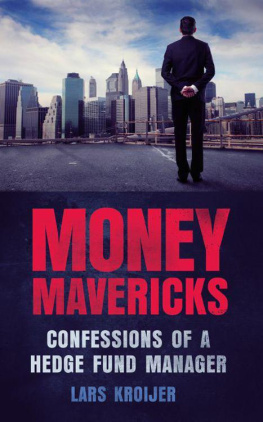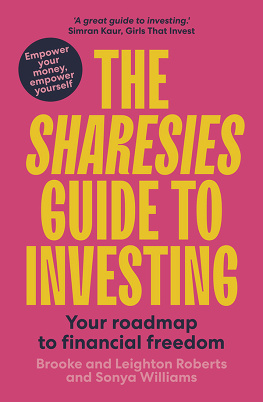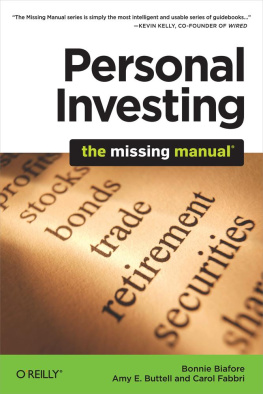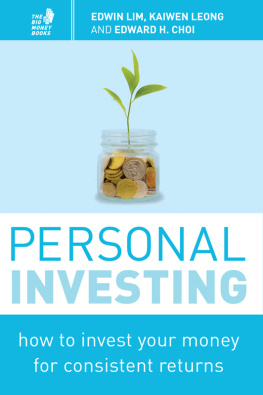Kroijer - Investing demystified: how to invest without speculation and sleepless nights
Here you can read online Kroijer - Investing demystified: how to invest without speculation and sleepless nights full text of the book (entire story) in english for free. Download pdf and epub, get meaning, cover and reviews about this ebook. year: 2013;2014, publisher: Pearson Education Limited;FT Press, genre: Business. Description of the work, (preface) as well as reviews are available. Best literature library LitArk.com created for fans of good reading and offers a wide selection of genres:
Romance novel
Science fiction
Adventure
Detective
Science
History
Home and family
Prose
Art
Politics
Computer
Non-fiction
Religion
Business
Children
Humor
Choose a favorite category and find really read worthwhile books. Enjoy immersion in the world of imagination, feel the emotions of the characters or learn something new for yourself, make an fascinating discovery.

Investing demystified: how to invest without speculation and sleepless nights: summary, description and annotation
We offer to read an annotation, description, summary or preface (depends on what the author of the book "Investing demystified: how to invest without speculation and sleepless nights" wrote himself). If you haven't found the necessary information about the book — write in the comments, we will try to find it.
Kroijer: author's other books
Who wrote Investing demystified: how to invest without speculation and sleepless nights? Find out the surname, the name of the author of the book and a list of all author's works by series.
Investing demystified: how to invest without speculation and sleepless nights — read online for free the complete book (whole text) full work
Below is the text of the book, divided by pages. System saving the place of the last page read, allows you to conveniently read the book "Investing demystified: how to invest without speculation and sleepless nights" online for free, without having to search again every time where you left off. Put a bookmark, and you can go to the page where you finished reading at any time.
Font size:
Interval:
Bookmark:

Since this is my first time writing about investments in a semi-technical way I have needed more help than the professors or personal finance professionals who often write about this topic. I am thrilled and honoured that such an accomplished and insightful group of people spent their time helping me. To start, I want to thank my wife, Puk Kroijer, for continuously supporting this project from the stage when it was still rumbling in my head. Soon after the rumblings were verbalised the publisher of my first book, Chris Cudmore, encouraged me to write a book and he and the team at Financial Times Publishing were again excellent at seeing the project through to conclusion.
A number of friends were also instrumental in the books completion by giving comments on early drafts as I stumbled towards a coherent argument: Steven Felsher with his extremely thorough system of numbering each paragraph (there were 8001 in one draft), former office mate Edwin Datson, Mark Hunter, Stuart Hamilton, Chris Rossbach with his sharp pencil, Paul Amery from Index Universe, Coenraad Vrolijk from Blackrock, Morten Bech from the Bank of International Settlements, Stphane Guibaud from London School of Economics, and my former professors Andrei Shleifer from Harvard University and Jay Light from Harvard Business School.
Finally, I would like to thank all those in and around the finance industry who consistently encouraged me to write about this subject and helped in various ways. While the book in general suggests investing in ways that lead to lower fees to the financial industry, the people I talked to had their customers interests as their first objective. This kind of honest objective bodes well for the future of finance even while it is generally vilified in the popular press and is perhaps in for a rough ride in the years ahead.
Finally, this book is dedicated to Puk, Anna, Sofia and Sydney the dog; my four girls.
Lars Kroijer
Lars Kroijer graduated Magna cum Laude from Harvard University with a degree in economics and received a MBA from Harvard Business School.
Lars is the author of Money Mavericks Confessions of a Hedge Fund Manager (second edition, 2012, FT Publishing). He currently serves on the Board of Directors of OVS Capital, Linden Grove Capital, Northlight Capital, Steadview Capital and Maj sinAI (London, Mumbai/Hong Kong and Copenhagen-based hedge funds), and ShipServ Inc. (the leading online platform for shipping supplies with annual sales of about $4 billion). He has frequently appeared as a finance expert on a broad range of media, including the BBC, CNN, CNBC, Bloomberg, the New York Times and Forbes magazine.
Lars was the CIO of Holte Capital Ltd, a London-based, market-neutral, special situations hedge fund which he founded in 2002 before returning to external capital in the spring of 2008. Prior to establishing Holte Capital, he served in the London office of HBK Investments focusing on special situations investing and event-driven arbitrage. In addition, he previously worked at SC Fundamental, a value-focused hedge fund based in New York, and the investment banking division of Lazard Frres in New York. Whilst at graduate school, he held internships with the private equity firm Permira Advisors (then Schroder Ventures) and management consulting firm McKinsey & Co.
A Danish national, Lars Kroijer lives in London and is married with twin daughters.
Today, most literature or other media on finance tell us how to make money. We are bombarded with stock tips about the next Apple or Google, read articles on how India or biotech investing are the next hot thing, or told how some star investment managers outstanding performance is set to continue. The implicit message is that only the uninformed few fail to heed this advice and those that do end up poorer as a result. We wouldnt want that to be us!
This book starts with a very different premise. It starts with the idea that markets are actually quite efficient. Even if some people are able to outperform the markets, most people are not among them. In financial jargon, most people do not have an edge over the financial markets, which is to say that they cant perform better than the financial markets through active selection of investments different from those made by the market. Embracing and understanding this absence of an edge as an investor is a key premise of the investment methods suggested in this book, and something I will discuss at length.
It is for investors everywhere who have several things in common:
- They feel that they are not getting value for money from the finance industry and find it opaque, but realise how important investments are to their lives. They read about phenomenally wealthy finance types, but feel that in paying fees, for example, the results are poor. Thinking about the great phrase Where are the customers yachts?, they dont even have a rowing boat.
- Ideally, they would like a simple portfolio of investments, but also want to feel that they can expect the best possible return for the risk they are willing to take.
- They may well have investments with typical investment managers as (despite themselves) they fell for the snazzy ads that showed great historical performance, which perhaps wasnt matched post-investment.
- They may have shares in blue chip companies like Google, Apple, Exxon or Vodafone, but at the same time recognise they are not expert stock pickers and consider that is something best left to the professionals.
- They may also know a lot about finance and have a genuine interest in it, but with a busy day job are unable to devote a lot of time to their personal portfolio. They need a portfolio that helps them sleep better at night, knowing that their savings are well looked after without having to spend too much time on it.
- They may have been directed by an adviser who they had retained to help simplify the jungle of investment products and were left unable to understand their portfolio mix. Perhaps without knowing if the adviser took a share of the high fees they were paying.
- They probably also think about investing longer term. While this book certainly has many immediate action items it is the opposite of the Spot the next hot stock or Make $10,000 a day without getting out of bed genre.
- They want a book on how to do a little bit better every year financially, with a big cumulative impact over time. If a hedge fund manager is a turbo-charged Ferrari, this book is akin to the grey Volkswagen that is a far better bet to get you safely to your destination in one piece.
So this book is about taking something as opaque and impenetrable as the financial market sector and demystifying it; thus Investing Demystified . Once investors realise that they do not have the investing edge to outperform the markets, and know that this is perfectly acceptable, the rational next step is quite logical and simple. I call this next step being the rational investor and the portfolio for that investor the rational portfolio.
So what is a rational investor?
The rational investor does not seek to outperform the financial markets, pay few fees and get higher returns for any level of risk, while incorporating individual tax and non-investment asset factors. He or she is rational about the low probability of having an edge in the markets and because of this insight will have a much improved financial performance.
The markets talk about investors having edge rather than having an edge or edging the market but in the interests of legibility and understanding we have kept jargon to a minimum.
Font size:
Interval:
Bookmark:
Similar books «Investing demystified: how to invest without speculation and sleepless nights»
Look at similar books to Investing demystified: how to invest without speculation and sleepless nights. We have selected literature similar in name and meaning in the hope of providing readers with more options to find new, interesting, not yet read works.
Discussion, reviews of the book Investing demystified: how to invest without speculation and sleepless nights and just readers' own opinions. Leave your comments, write what you think about the work, its meaning or the main characters. Specify what exactly you liked and what you didn't like, and why you think so.










